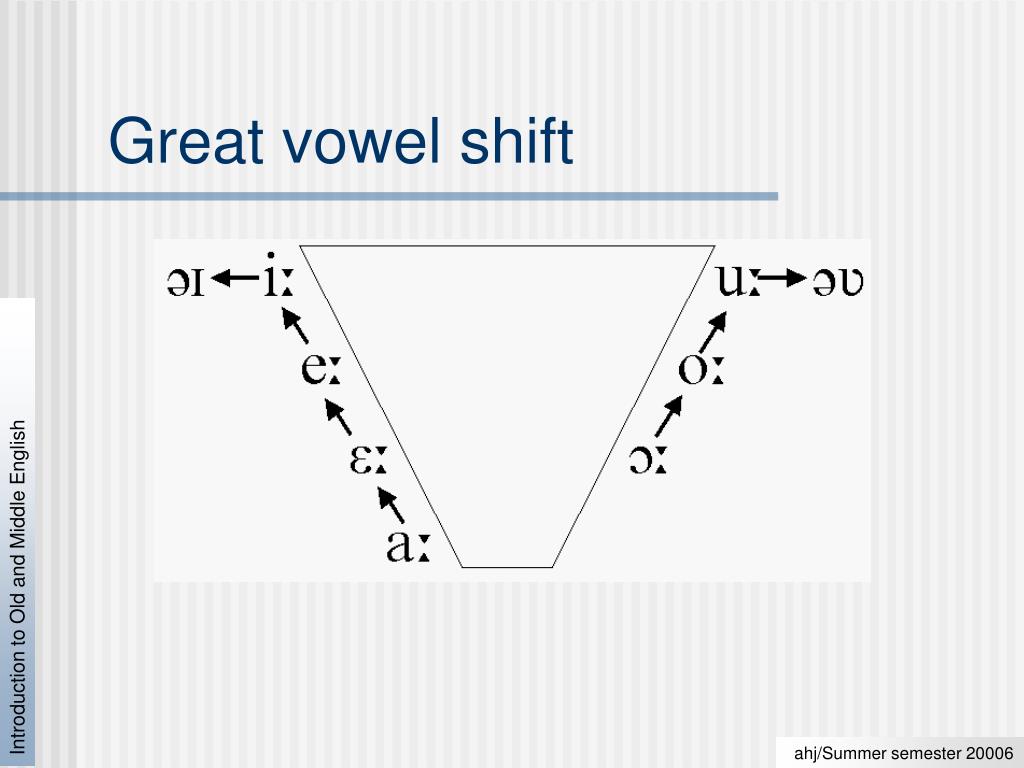
One can pronounce it root or ra-out depending on where they are and to whom they are talking. But often, people would pronounce words a specific way based on where they lived.Īn example of this occurring today is the word route. In so many words, vowels started to be pronounced closer to the front of the mouth, which meant as the shift happened some words were pronounced differently. “The consonants remain generally the same, though Chaucer rolled his r’s, sometimes dropped his aitches, and pronounced both elements of consonant combinations, such as ‘kn,’ that were later simplified.”

“The main difference between Chaucer’s language and our own is in the pronunciation of the ‘long’ vowels,” states Harvard University. In the beginning, vowels were a bit different from what we know them as today and the shift between the times of Chaucer, Shakespeare, and afterward are indicative of this change. As such, today we are going to look at The Great Vowel Shift!

In fact, like most things, the shift was a gradual evolution from one thing to the next and it has a complex history. In Conclusion … No one knows for certain what caused the Great Vowel Shift, but it’s because of these changes during this period that English has so many strange pronunciations.The Great Vowel Shift sounds like some sort of cataclysmic event where the world suddenly split open and words spilled out everywhere and now suddenly humans all talk differently, but that is not really the case at all. Scholars have identified a mechanism for the “The Great English Vowel Shift” as a celebrated instance of what they call a “Chain shift” – a sound change with impacts several sounds one after the other, as a kind of chain reaction. The influx of French “loanwords”Ĭonversely whilst the nobility were beginning to speak English the peasants were having to grapple with an influx of French “loanwords” – no doubt brought in by their noble overlords. Virulent outbreaks of plague, also know as the ‘Black Death’, in the late 14th and early 15th century saw vast swathes of the population perish and as a consequence a redistribution of populations when people from many different regions emigrated to the southeast of England, where it’s thought that their accents were combined to create new pronunciations based on the standard London vernacular of the time. However several very plausible theories exist that attempt to explain it and as with most things in life the real answer is probably a combination of all of them to varying degrees. Rather disappointingly we have to say up front that no one is entirely sure what the actual causes of the vowel shift were. Pronunciation before the Great Vowel Shift The main phases identified by scholars are : Old English Middle English Early Modern English Late Modern English and English Today. Of course the language itself has ever been evolving and would have transformed gradually over time so we shouldn’t regard these periods as absolute but see the English language as a spectrum of change, morphing gradually over time. The history of the English language has been neatly divded, by modern scholars, into about 5 distinct periods. But what could have possibly caused this ? The History of English : An Overviewīefore we look at what could have possibly happened to so alter the way vowels were pronounced lets put this in context to what we know of the development of the English language to date. Something curious happened in the 14th and 15th centuries when, in little over 200 years, the way we spoke English changed very rapidly indeed. The problem arose from something linguistic scholars call ‘The Great Vowel Shift’.


These inconsistencies weren’t always there and there was only one way to pronounce each vowel so that before approximately 1300 English pronunciation was much more consistent.


 0 kommentar(er)
0 kommentar(er)
